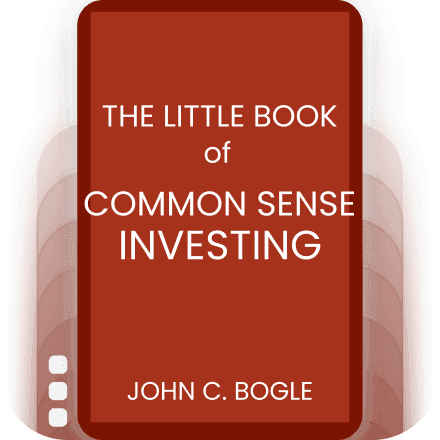
The Little Book of Common Sense Investing
John C. Bogle
4.4 - 5 ratings
10
List Points
10
Chapters
5
Topics
Description
John C. Bogle's work emphasizes the importance of low-cost, long-term investing by advocating a straightforward, back-to-basics approach to building wealth. It champions the idea of owning a diversified portfolio of stocks through index funds, which outperform actively managed funds over time due to lower costs and consistent market returns. Bogle educates readers on the principles of patience, simplicity, and rational investment strategies, warning against the detrimental effects of speculative behavior and high fees that can erode investment gains. By adhering to these time-tested principles, investors can achieve reliable and substantial growth.
What will you learn?
By reading John C. Bogle's seminal work, you will learn the principles of low-cost, long-term investing, emphasizing the crucial importance of index funds over actively managed funds. The book provides insights into how you can grow your wealth by exploiting the inherent advantages of broad market index funds, minimizing fees, and embracing a disciplined, long-term investment strategy that resists the allure of market timing and short-term speculation. Bogle’s clear guidance on these fundamental investing concepts will help you build a solid, more predictable financial future.
Who’s it for?
• Beginner investors looking to understand the fundamentals of investing.
• Individuals seeking advice on building a diversified investment portfolio.
• Long-term investors interested in low-cost index funds.
• Financial advisors aiming to offer practical investing principles to clients.
• Savers and retirees wanting to grow their wealth with minimal risk.
Categories
Key Learning
Available chapters to listen for this topic- 1
Understand the Simplicity of Index Investing
Learn why owning a diversified portfolio of stocks through low-cost index funds is the most effective investment strategy for growing your wealth over the long term. - 2
The Inevitability of Costs in Investment
Explore how fees, expenses, and taxes significantly impact your investment returns, and why minimizing these costs is crucial to achieving higher net gains. - 3
The Impact of Market Efficiency
Delve into the efficient market hypothesis, which argues that stock prices reflect all available information, making it nearly impossible to consistently outperform the market through individual stock picking or active management. - 4
The Magic of Compounding Returns
Discover the power of compound interest and how reinvested dividends and interest can exponentially increase the value of your investments over time. - 5
The Importance of Diversification
Understand why spreading your investments across a broad range of asset classes and geographic regions helps mitigate risks and stabilize returns. - 6
The Historical Performance of Stocks
Examine long-term data demonstrating the superior returns of equities over other asset classes, and why staying the course is essential for reaping these rewards. - 7
Avoiding the Dangers of Speculation
Recognize the pitfalls of market timing and speculative investing, and why a patient, long-term approach is more likely to result in financial success. - 8
The Role of Behavioral Finance
Learn how psychological factors and cognitive biases can affect your investment decisions, and strategies to avoid emotional investing that can harm your portfolio. - 9
The Benefits of Dollar-Cost Averaging
Discover how investing a fixed amount periodically, regardless of market conditions, can reduce the impact of volatility and lower the average cost per share over time. - 10
Building a Balanced Portfolio
Explore the principles of asset allocation and rebalancing, ensuring that your investment portfolio aligns with your risk tolerance, investment goals, and time horizon for optimal performance.
























